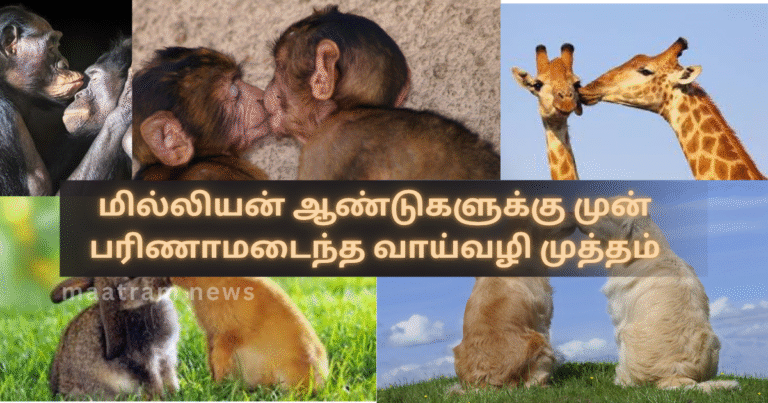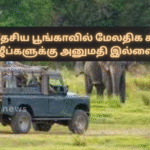வாய்வழி முத்தம் 21 மில்லியன் ஆண்டுகளுக்கு முன்னரே பரிணாம வளர்ச்சி அடைந்தது என்றும், மனிதர்கள் மற்றும் பிற பெரிய குரங்குகளின் பொதுவான மூதாதையர் பெரும்பாலும் முத்தமிட்டிருக்கலாம் என்றும் இந்த ஆய்வுகள் மூலம் தெரிய வந்துள்ளதாக பிபிசி செய்தி வெளியிட்டுள்ளது.
ஒக்ஸ்போர்ட் பல்கலைக்கழகத்தின் பரிணாம உயிரியலாளரான மட்டில்டா பிரிண்டில் தலைமையிலான ஆராய்ச்சியாளர்கள், பல்வேறு இனங்களில் ஒத்த நடத்தைகளைக் கவனித்து, முத்தத்தின் தோற்றத்தைக் கண்டறிய ஒரு “பரிணாம குடும்ப மரத்தை” உருவாக்கினர்.
இதில் முத்தம் சுமார் 21.5 மில்லியன் ஆண்டுகளுக்கு முன்பு பெரிய குரங்குகளில் பரிணாமம் அடைந்தது என்று மதிப்பிடப்பட்டுள்ளது.
மனிதர்கள், சிம்பன்சிகள் மற்றும் பொனோபோக்கள் அனைத்தும் முத்தமிடுவதைப் பார்த்ததன் மூலம், அவற்றின் பொதுவான மூதாதையர் முத்தமிட்டிருக்க வாய்ப்புள்ளது என்று ஆராய்ச்சியாளர்கள் முடிவு செய்தனர்.
சுமார் 40,000 ஆண்டுகளுக்கு முன்பு அழிந்துபோன நமது நெருங்கிய பண்டைய மனித உறவினர்களான நியாண்டர்தால்ஸ் கூட முத்தமிட்டிருக்கலாம் என்றும் இந்த ஆய்வு முடிவு செய்துள்ளது.
நவீன மனிதர்களும் நியாண்டர்தால்ஸும் வாய்வழி நுண்ணுயிரியை (உமிழ்நீர் பாக்டீரியா) பகிர்ந்து கொண்டதற்கான ஆதாரம் உள்ளது.
இது இரண்டு இனங்களும் பிரிந்த பிறகு “இலட்சக்கணக்கான ஆண்டுகளுக்கு உமிழ்நீரைப் பரிமாறிக் கொண்டிருக்க வேண்டும்” என்பதைக் குறிக்கிறது.
ஓநாய்கள், பிரெய்ரி நாய்கள், பனி கரடிகள் மற்றும் ஆல்பட்ராஸ்கள் போன்ற விலங்குகளிடமும் முத்தத்தின் விஞ்ஞான வரையறைக்கு ஒத்த நடத்தை காணப்பட்டது.
வெவ்வேறு இனங்களில் ஒரே மாதிரியான நடத்தையை ஒப்பிடுவதை உறுதி செய்வதற்காக, ஆராய்ச்சியாளர்கள் ஒரு துல்லியமான வரையறையை உருவாக்கினர்.
Evolution and Human Behaviour என்ற இதழில் வெளியிடப்பட்ட அவர்களின் ஆய்வில், முத்தம் பின்வருமாறு வரையறுக்கப்பட்டுள்ளது.
“உணவுப் பரிமாற்றம் இல்லாமல், உதடுகள் அல்லது வாய் பாகங்களின் சில அசைவுகளுடன் கூடிய, ஆக்ரோஷமற்ற, வாய்-வாய் தொடர்பு” எனக் குறிப்பிடப்பட்டுள்ளது.
இந்த ஆய்வு முத்தம் எப்போது பரிணாமம் அடைந்தது என்பதைக் குறிப்பிட்டாலும், ஏன் என்ற கேள்விக்கு உறுதியான பதிலைக் கொடுக்க முடியவில்லை.
ஏனெனில், முத்தமிடுவது வெளிப்படையான உயிர் பிழைப்பு அல்லது இனப்பெருக்க நன்மைகளைக் கொண்டிருக்கவில்லை, இருப்பினும் இது பல மனித சமூகங்களிலும் விலங்கு இராச்சியத்திலும் காணப்படுகிறது.
மனித கலாசாரத்தில் முத்தமிடுவது காதல் அர்த்தங்களைக் கொண்டிருந்தாலும், இது நமது மனிதரல்லாத உறவினர்களுடன் நாம் பகிர்ந்து கொள்ளும் ஒரு நடத்தை என்பதைப் புரிந்துகொள்வது முக்கியம் என்று மருத்துவர் பிரிண்டில் நம்புகிறார் என அந்த செய்தியில் தெரிவிக்கப்பட்டுள்ளது.
மேலதிக தகவல்களுக்கு மாற்றம் செய்திகள் இணையத்தளத்தினுள் பிரவேசியுங்கள்.
மேலதிக தகவல்களை உடனுக்குடன் பெற்றுக்கொள்ள மாற்றம் செய்திகள் முகநூல் பக்கத்தை பின்தொடரவும்.
Kissing Evolved 21 Million Years Ago
BBC News reports that kissing evolved as far back as 21 million years ago, and that the common ancestors of humans and other great apes were likely to have engaged in kissing.
Researchers led by Dr. Matilda Brindle, an evolutionary biologist at the University of Oxford, observed similar behaviours across different species and created an “evolutionary family tree” to trace the origins of kissing.
The study estimates that kissing evolved in great apes around 21.5 million years ago.
Researchers concluded that since humans, chimpanzees, and bonobos have all been observed kissing, their common ancestor was also likely to have kissed.
The study further suggests that even Neanderthals, our close ancient human relatives who went extinct about 40,000 years ago, may have also kissed.
There is evidence that modern humans and Neanderthals shared oral microbes (saliva bacteria).
This indicates that the two species must have been “exchanging saliva for hundreds of thousands of years” after they diverged.
Behaviours similar to the scientific definition of kissing have also been observed in animals like wolves, prairie dogs, polar bears, and albatrosses.
To ensure consistent comparisons across species, the researchers created a precise definition.
In their study published in the journal Evolution and Human Behaviour, kissing is defined as:
“Non-aggressive, mouth-to-mouth contact involving some movements of the lips or mouth parts, without food exchange.”
Although the study identifies when kissing evolved, it does not provide a definite answer to why kissing originated.
This is because kissing does not appear to provide any obvious survival or reproductive advantage, yet it exists across many human societies and in the animal kingdom.
Dr. Brindle believes that while kissing carries romantic meanings in human culture, it is important to understand that it is a behaviour shared with our non-human relatives, according to the report.



